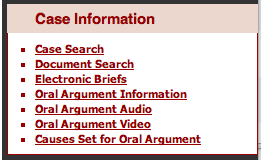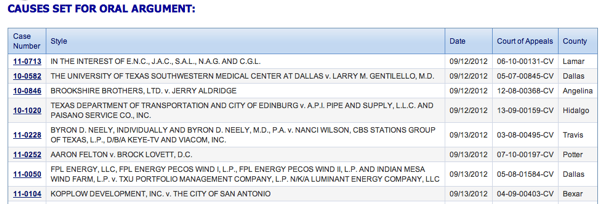Category: 'News and Links'
July 27th, 2012 · Comments Off on New blog about the Dallas Court of Appeals: ‘600 Commerce’
There is a new blog covering commercial cases in the Dallas Court of Appeals, with a name inspired by the courthouse address: 600 Commerce.
If that naming convention reminds you of 600 Camp, the blog about commercial cases in the federal Fifth Circuit, it’s no coincidence. 600 Commerce is also written by lawyers at Lynn, Tillotson, Pinker & Cox, LLP.
Tags: News and Links
July 18th, 2012 · Comments Off on The new TAMES search window is online

This week the Court has rolled out the first public part of the TAMES system, its docket pages and the search window you use to reach them.
The new format for docket pages includes electronic versions of motions and orders, as well as an impressive amount of detail about things like which dates attorneys are listing on vacation letters. (( I don’t think there will be a Please Rob Me competitor for Texas attorneys, but you never know. ))
The case search window allows you to filter by characteristics such as county, court of appeals, or even attorney name. Let the vanity searches begin…
The window includes an option to “Exclude Inactive Cases.” Based on some poking around, it looks like TAMES draws that line exactly where DocketDB does — when a case file has been closed and stored.
A glimpse of things to come is at the bottom of this new menu, with an option to see “Causes Set for Oral Argument.” The page displays a list of upcoming arguments, linked back to the Court’s docket information.

Tags: Legal Tech · News and Links
July 17th, 2012 · Comments Off on Roundup: primary runoff, Justice Willett op-ed about the ACA decision, and TAMES is coming this week
The Medina-Devine runoff is July 31st
Compared to 2010 (when there was the excitement of an open seat and a wide-open primary), there has been relatively little press coverage of this year’s Texas Supreme Court elections. One of those contests is now in a runoff for the Republican nomination: incumbent Justice David Medina against challenger (and former judge) John Devine.
In the March 29th primary, Justice Medina got 39.0% of the vote, Devine got 32.2%, and Joe Pool Jr. got 28.8%.
On Friday, Morgan Smith of the Texas Tribune published a good overview of the politicking for this seat: “Questions Of Qualifications, Ethics in Texas Court Race”.
Justice Willett writes about the ACA decision
The Houston Chronicle published an article by Justice Willett titled “Parsing the court’s decision on Obamacare” that puts the decision in a political context, as well as discussing “the judicial activism canard.”
CLE on “Electronic Briefs”
I’ll be speaking about electronic briefs this Friday at the State Bar’s “summer school” course in Galveston. If you’re there — and the weather forces you to stay inside for my talk — please say hello.
It’s amazing how fast this transition has happened in Texas. Two years ago, there was resistance to preparing a courtesy PDF copy for the Texas Supreme Court. Now, we are moving quickly toward mandatory e-filing in all civil appeals statewide.
An update on changes to Texas court websites
According to TexParte, the Texas Supreme Court switched its internal systems over to TAMES yesterday, and the public website should make the jump “later this week.”.
I’ve started to prepare SCOTXblog for the transition. This weekend, I wrote some WordPress plugins to remap the links in my blog archives to point to more stable locations that I can control. If you see broken links on my blog after the TAMES transition, please let me know. And if you run a blog about Texas law and find your own links breaking, feel free to call.
Tags: News and Links
June 13th, 2012 · Comments Off on Majority of federal judges are (already) using iPads; Justice Guzman goes to summer school; Petty lawsuit over
Now a majority of federal judges are using iPads
Judge David Nuffer (District of Utah) wrote a guest post on 3 Geeks and a Law Blog with some thoughts about the use of iPads by his colleagues on the federal bench.
The post begins by citing a recent report that 58% of federal judges “use an iPad for their court work.” (( He notes that the percentage of federal bankruptcy judges using iPads is higher (70%), but he does not mention the percentage of federal appellate judges using them. I can’t locate the survey online to check. ))
Judge Nuffer explained that they “have replaced laptops for many judges.” In particular, they are used not only for email but also for reading PDFs filed through the e-filing system.
Most judges also use an iPad for general reading because electronically filed documents are all PDF format. Apps such as PDF Expert, iAnnotate and Goodreader work well with these PDF documents. The documents can be annotated while reading and the annotations persist when the document is returned to chambers storage servers. Judges appreciate the ability to take voluminous documents with them in the same device they use for email. This results in less printing of electronically filed papers.
This echoes some of what Texas practitioners heard at the UT appellate conference two weeks ago. In 2010, the theme across the judicial panels panels was “e-briefs.” This year, it was “iPads.” The panel of Texas Supreme Court Justices noted that they are using a variety of devices, including the iPads that they have been issued. At least some of Texas’s intermediate appellate courts have also bought iPads for the use of the judges. And the panel of federal Fifth Circuit judges also mentioned that some judges are starting to review the parties’ briefs on iPads in preparation for oral argument.
Justice Guzman goes to summer school
Justice Eva Guzman is among the enrollees in the inaugural class of Duke University’s Master of Laws in Judicial Studies degree program.
She was quoted in an article in The Herald-Sun about the new program and how it fits into the schedule of a working judge:
Committing to the program, explained Eva Guzman, a justice of the Texas Supreme Court, has required some juggling and some very full days.
“While you’re here, you have to keep up with your full-time job back home,” Guzman said. “After your classes and dinner, you then begin your second eight-hour job.”
According to this list of enrollees, the class also includes Justice Frost of Houston’s Fourteenth Court of Appeals.
Source: The Herald-Sun, “The judges take a seat”
The challenge to Justice Hecht’s ballot eligibility has been dropped
Michele Petty, who is the Democratic nominee to run against Justice Hecht in the fall election, has dropped her challenge to his ballot eligibility.
According to the Statesman article, Petty concluded that any technical defect in the petitions had not actually confused any of the voters:
In a motion to dismiss her lawsuit, Petty told the Travis County District Court that her investigation revealed that voters “understood what they were doing” when they signed the petitions.
“Petty felt it would not be fair to invalidate their signatures because of error on the part of the circulators or notary,” said the filing.
In the filing, Petty also encourages the Legislature to revisit the requirement that judicial candidates solicit these signatures at all. Currently, state law requires potential judicial candidates who would run as Republicans or Democrats to obtain 50 signatures from each of Texas’s fourteen appellate districts. It does not impose the same requirements on third-party candidates.
Tags: Legal Tech · News and Links
April 25th, 2012 · Comments Off on Thursday: An Evening with the Texas Supreme Court
This Thursday (April 26th) is the “Evening with the Texas Supreme Court” reception and panel discussion. And don’t let the name fool you: The event starts at 4:30 p.m. It’s at the Stephen F. Austin Hotel at 7th and Congress in Austin.
Two years ago, the event featured a great panel discussion (that I wrote about here). This year, we are expecting seven of the Justices to participate.
The event requires a ticket, which is $30 at the door. (Your check can be made out to “Civil Appellate Section.”) It has been approved for 1.5 hours of CLE (with 0.5 hours of ethics). The event is jointly sponsored by the appellate sections of the State Bar and of the Austin Bar.
Tags: News and Links
April 10th, 2012 · Comments Off on NPR story about Virginia’s “Episcopal Battle”
On Tuesday afternoon, I heard an NPR story about a legal battle in Virginia that reminded me of some cases that will be heard by the Texas Supreme Court this fall.
The Texas cases are Masterson v. Dicocese of Northwest Texas, No. 11-0332, and The Episcopal Diocese of Fort Worth v. The Episcopal Church, No. 11-0265 (direct appeal). Both involve questions about how to divide property when a local diocese splits from a national church organization — and how the First Amendment might limit the ability of Texas courts to speak to these questions.
The Virginia lawsuit actually ended about two years ago with The Protestant Episcopal Church v. Truro Church, 694 S.E.2d 555 (Va. 2010). The court there sided with the umbrella entity (the “hierarchical church”), concluding as a matter of Virginia statutory law that the requirements to show a property division had not been established. For that reason, the Virginia court did not reach the federal constitutional question.
The NPR story isn’t strictly a legal story — there’s no discussion of the merits of the suit. The focus is on how the Virginia lawsuit has affected congregations on both sides of the suit as they now try to disentangle their property and move forward.
Source: “A Church Divided: Ruling Ends Va.’s Episcopal Battle”
Tags: Case Notes · News and Links
February 27th, 2012 · Comments Off on Another vexing question about medical-expense evidence in Texas
Over at Reverse and Render, Hilaree Casada has written about a new issue in the wake of Haygood v. Escabedo, No. 09-0377.
In Haygood, the Court concluded that Texas law only allowed the recovery of actual medical expenses, not the inflated amount that hospitals might bill insurers expecting it to be reduced. Along the way, it concluded that evidence of this inflated bills was inadmissible as not even probative of the true amount.
One remaining question is whether the trial court can cure Haygood problems (say, inadmissible evidence in the form of inflated bills) by reducing the jury’s damage award to the proper amount. The Amarillo Court concluded, in a divided decision, that reversal was required even though the trial court’s judgment was for the right amount.
Hilaree’s post is here: “41.0105 — post-judgment reduction does not cure error”. The Amarillo Court opinions are here: Majority (Hancock, J.); Concurrence (Pirtie, J.); Dissent (Quinn, C.J.).
Tags: Case Notes · News and Links
February 22nd, 2012 · 4 Comments
In 2009, I wrote about “Who owns your appellate briefs?” At the time, I was annoyed at being asked to file an extra unbound paper copy of a brief to be mailed to a commercial publisher so they could scan the paper and resell it to other lawyers. Since then, the Texas courts have moved toward e-filing, so the publisher and the public often have access to the same PDF.
Today, the Wall Street Journal reports about a lawsuit that turns this academic question into a federal case. The suit seeks class certification for its claim that both West and Lexis have been infringing copyright be reselling access to appellate and trial papers. [Read more →]
Tags: Legal Writing · News and Links




